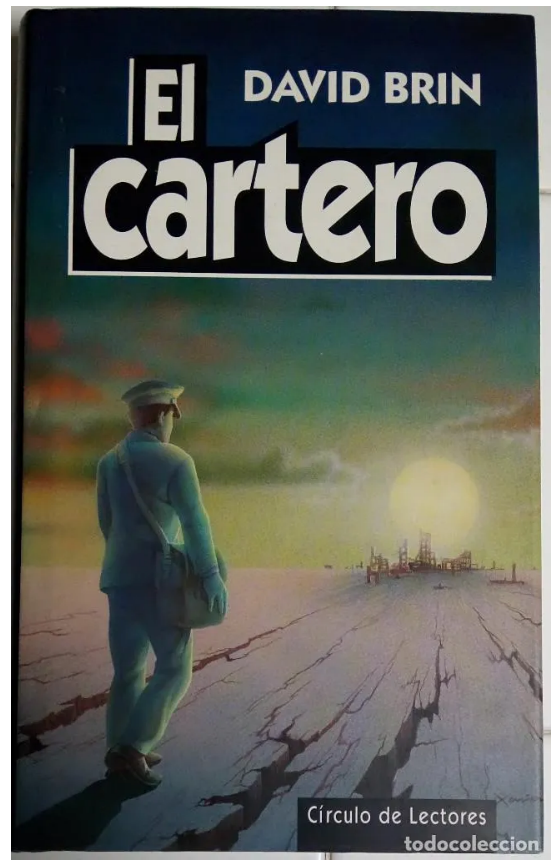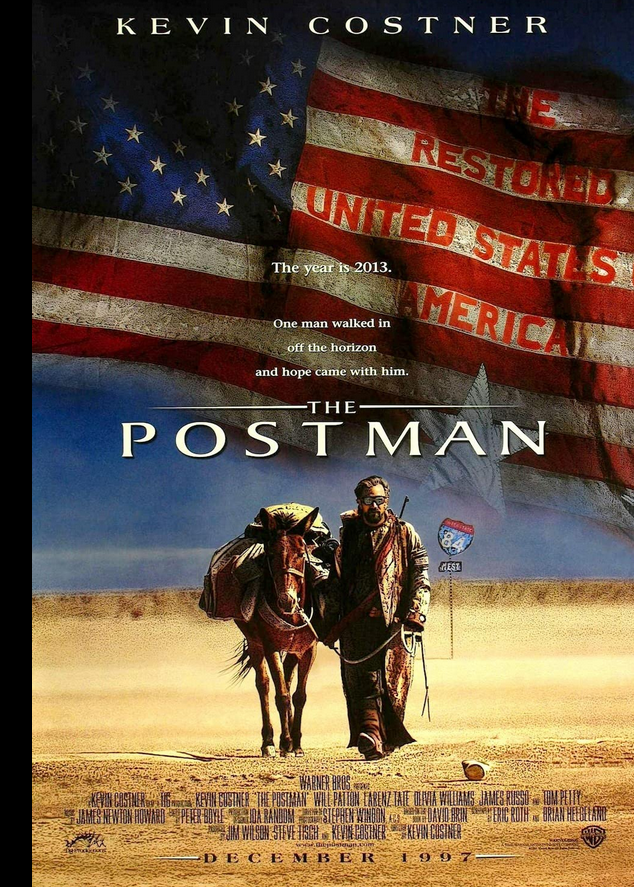
Hello #hivers,
today I want to tell you about a book whose author I discovered by chance when I bought the book in a used book shop when I was living in Europe.
I was struck by the description that publishers normally give on the back of the cover and with it being at a good price I bought it without hesitation. As I have done with so many of the books that make up my beloved library.
The author is David Brin, the title is The Postman, although in some editions it can also be found as The Postman, which is the title with which he identified it commercially after Kevin Costner made a film based on the book and with that title in 1986 (a year after its publication).
I actually like the book better than the film, but then again, to each his own.
The curiosity is that the book was actually originally written in two separate stories that were later unified.
The plot takes place in a post-apocalyptic setting after two large nuclear bombs have devastated humanity.
But nevertheless the novel talks about the civilisation that existed at that time before the war and the symbols it still preserves.

After a worldwide nuclear conflict in the USA there have been only small communities of survivors left after the long atomic winter who are trying to rebuild their lives under an acceptable form of coexistence and civilisation.
Still lacking the most elementary things like electricity, they are trying to rebuild their lives.
In this context, a military sect with feudalistic overtones aspires to subdue (or kill) all the survivors in order to become the undisputed masters of what is left of the country.
There are probably other similar communities scattered throughout the Americas, but it is impossible to know exactly.
The only way to travel the distances and find these communities is on foot through the mountains trying to avoid the Holnist hordes or on horseback, those lucky enough to own them.
And in this bleak, lonely and depressing context the main protagonist Gordon Krantz finds in an abandoned corpse a badge that will repair him from the intense cold of the mountains and valleys of Oregon.
That simple, worn coat is the badge of a postman murdered perhaps for futile motives or simply to be robbed of what little he has.
Someone whose only thing he managed to save from his previous life was that: the badge of his work.
Gordon Krantz, who wanders from community to community telling tales to earn himself food and shelter, attracts attention with this unknown motto.
And if he happens to put into practice a kind of story-telling gimmick: he claims to be the representative of the new government called the New Reconstituted United States that is trying to return to what it was and is using the postal service to connect all the communities together.
What is first a fantasy soon becomes reality, the illusion of so many desperate people who do not know whether their friends or relatives have been saved, have succumbed to nuclear devastation or live in other regions.
Unable to declare his lie, Krantz goes ahead with his project and collects hundreds of letters from each community for unknown future recipients.
Soon he becomes a symbol of hope (and respect) for the return of the "old world".
It is a new hope for communities threatened by murderous hordes living in desperation and fear of discovery.
The national communications system is broken and the only possibility to communicate with the outside world is him: the Postman. The ultimate representative of a new government, apparently in gestation.
In a chaotic and disorganised world, at the mercy of the strongest, reminiscent of the Middle Ages and feudalism, the new government does not exist, nor does the new communications network.
All that exists is the fantasy and illusion that allows them to fight (and defeat) a real enemy: a tyranny greedy for imperial insignia to which they must pay homage for their own safety.

Hola #hivers,
hoy les quiero comentar un libro cuyo autor descubrí un poco por casualidad al comprar el libro en un negocio de libros usados cuando vivía en Europa.
Me llamó la atención la descripción que normalmente hacen las editorial al dorso de la portada y con estaba en un buen precio lo compré sin dudar dos veces. Como he hecho con tantos de lis libros que forman mi querida biblioteca.
El autor es David Brin, el título es El Cartero, aunque en algunas ediciones también lo pueden encontrar como The Postman que es el título con el que lo identificó a nivel comercial despue0s que en 1986 (un año después de su publicación) Kevin Costner hiciera una película basada en el libro y con ese título.
En realidad me gusta más el libro que la película, pero en fin, cada uno tiene sus gustos.
La curiosidad es que el libro en realidad había sido escrito originariamente en dos cuentos separados que luego fueron unificados
La trama se desarrolla en un escenario post-apocaliptico después que dos grandes bombas nucleares han devastado la humanidad.
Pero no obstante ello la novela habla de la civilización que existía en ese tiempo antes de la guerra y de los símbolos que aún conserva.

Luego de un conflicto nuclear a nivel mundial en los EE. UU. han quedado solo pequeñas comunidades de sobrevivientes luego del largo invierno atómico que tratan de reconstruir sus vidas bajo una forma aceptable de convivencia y civilización.
Aún careciendo de las cosas más elementales como la electricidad
En ese contexto una secta militar con resabios feudalistas aspira a someter todos los sobrevivientes (o matarlos) para quedar como dueños indiscutidos de lo que queda del país.
Probablemente hay otras comunidades similares desparramadas a lo largo de todo el territorio americano, pero es imposible saberlo con exactitud.
El único modo de recorrer las distancias y encontrar estas comunidades es hacerlo a pie a través de las montañas tratando de evitar las hordas holnistas o a caballo, los que tienen la suerte de poseerlos.
Y en ese contexto sombrío, solitario y deprimente el protagonista principal Gordon Krantz encuentra en un cadáver abandonado una divisa que lo va a reparar del frío intenso de las montañas y los valles del Oregón.
Ese simple y gastado abrigo es la divisa de un cartero asesinado tal vez por fútiles motivos o para ser simplemente robado d elo poco que tiene.
Alguien que de su vida anterior lo único que logró salvar fue eso: la divisa de su trabajo.
Gordon Krantz que vaga de comunidad en comunidad contando cuentos para ganarse reparo y comida llama la atención con esa divisa desconocida.
Y si le ocurre meter en práctica una especie de cuento-artilugio: dice ser el representante del nuevo gobierno llamado Los Nuevos Estados Unidos Reconstituídos que está tratando de volver a ser lo que era y está utilizando el servicio postal para conectar entre si todas las comunidades.
Lo que primero es una fantasía se transforma pronto en realidad, ilusión de tantos desesperados que no saben si sus amigos o familiares se han salvado, han sucumbido a la desvastación nuclear o viven en otras regiones.
Incapaz de declara su mentira Krantz sigue adelante con su proyecto y va recogiendo de cada comunidad centenares de cartas para futuros y desconocidos destinatarios.
En seguida pasa a representar un símbolo de esperanza (y respeto) para el retorno del "viejo mundo".
Es una nueva esperanza para comunidades amenzadas por hordas asesinas que viven en la desesperación y el temor de ser descubiertos.
El sistema nacional de comunicaciones está roto y la única posibilidad de comunicar con el mundo externo es él: el Cartero. El máximo representante de un nuevo gobierno, en aparente gestación.
En un mundo caótico y desorganizado, a la merced del más fuerte, que recuerda mucho la Edad Media y el feudalismo, el nuevo gobierno no existe, la nueva red de comunicaciones en marcha tampoco.
Lo único que existe es la fantasía y la ilusión que les permite combater (y vencer) un enemigo real: una tiranía ávida de insignias imperiales a las que deben rendir homenaje por su propia seguridad.

𝕳𝖆𝖕𝖕𝖞 𝖍𝖔𝖑𝖎𝖉𝖆𝖞𝖘 𝖙𝖔 𝖆𝖑𝖑 𝖙𝖍𝖊 #𝖍𝖎𝖛𝖊𝖗𝖘 𝖔𝖋 𝖙𝖍𝖎𝖘 𝖇𝖊𝖆𝖚𝖙𝖎𝖋𝖚𝖑 𝖕𝖑𝖆𝖙𝖋𝖔𝖗𝖒, 𝖜𝖎𝖙𝖍 𝖙𝖍𝖊 𝖇𝖊𝖘𝖙 𝖜𝖎𝖘𝖍𝖊𝖘 𝖋𝖔𝖗 𝖞𝖔𝖚 𝖙𝖔 𝖘𝖆𝖞 𝖌𝖔𝖔𝖉𝖇𝖞𝖊 𝖙𝖔 𝖙𝖍𝖎𝖘 𝖞𝖊𝖆𝖗 𝖎𝖓 𝖙𝖍𝖊 𝖇𝖊𝖘𝖙 𝖜𝖆𝖞 𝖆𝖓𝖉 𝖜𝖊𝖑𝖈𝖔𝖒𝖊 𝖙𝖍𝖊 𝖓𝖊𝖝𝖙 𝖔𝖓𝖊 𝖜𝖎𝖙𝖍 𝖙𝖍𝖊 𝖍𝖔𝖕𝖊 𝖔𝖋 𝖆 𝖍𝖆𝖕𝖕𝖞 𝖋𝖚𝖙𝖚𝖗𝖊.
𝕱𝖊𝖑𝖎𝖈𝖊𝖘 𝖋𝖎𝖊𝖘𝖙𝖆𝖘 𝖕𝖆𝖗𝖆 𝖙𝖔𝖉𝖔𝖘 𝖑𝖔𝖘 #𝖍𝖎𝖛𝖊𝖗𝖘 𝖉𝖊 𝖊𝖘𝖙𝖆 𝖍𝖊𝖗𝖒𝖔𝖘𝖆 𝖕𝖑𝖆𝖙𝖆𝖋𝖔𝖗𝖒𝖆, 𝖈𝖔𝖓 𝖑𝖔𝖘 𝖒𝖊𝖏𝖔𝖗𝖊𝖘 𝖆𝖚𝖌𝖚𝖗𝖎𝖔𝖘 𝖕𝖆𝖗𝖆 𝖖𝖚𝖊 𝖉𝖊𝖘𝖕𝖎𝖉𝖆𝖓 𝖊𝖘𝖙𝖊 𝖆ñ𝖔 𝖉𝖊 𝖑𝖆 𝖒𝖊𝖏𝖔𝖗 𝖒𝖆𝖓𝖊𝖗𝖆 𝖞 𝖗𝖊𝖈𝖎𝖇𝖆𝖓 𝖊𝖑 𝖕𝖗ó𝖝𝖎𝖒𝖔 𝖈𝖔𝖓 𝖑𝖆 𝖊𝖘𝖕𝖊𝖗𝖆𝖓𝖟𝖆 𝖉𝖊 𝖚𝖓 𝖋𝖚𝖙𝖚𝖗𝖔 𝖛𝖊𝖓𝖙𝖚𝖗𝖔𝖘𝖔.

Translation carried out with: DeepL Translator.
Traducción efectuada con: DeepL Translator.